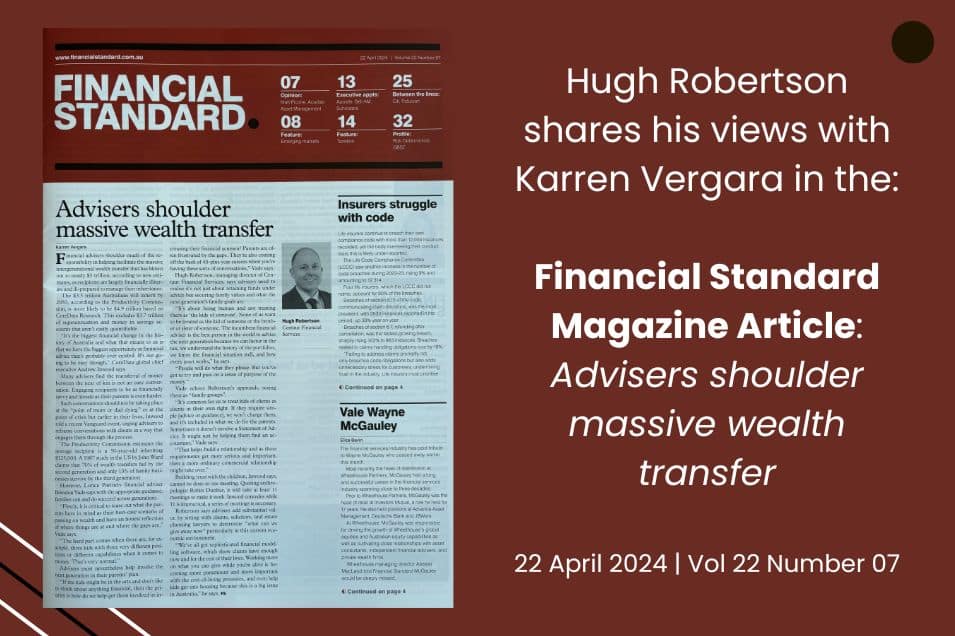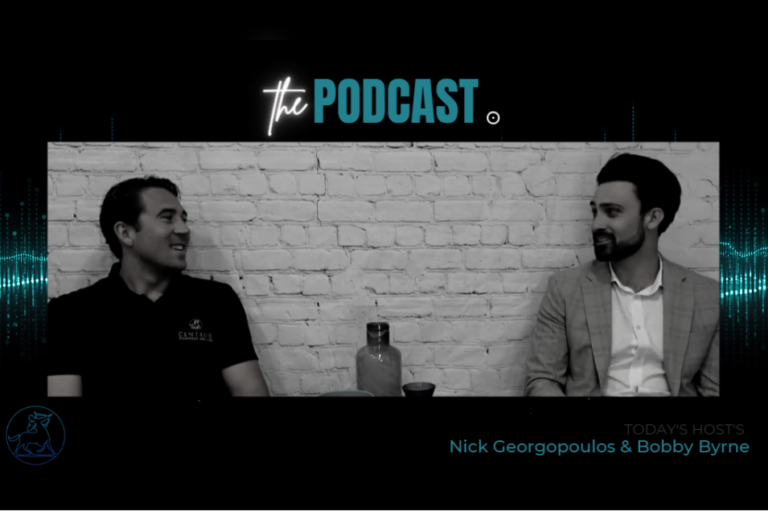Our very own Hugh Robertson was invited to chat with Karren Vergara from Financial Standard Magazine to talk about the huge responsibility Financial Advisers have in helping clients navigate the world of Intergenerational Wealth Transfers.
Whilst Centaur Financial Services has recorded an episode of the PODCAST on this topic (click here to view), Hugh talks openly and informatively with the Financial Standard Magazine in their latest addition – 22nd April 2024 | Volume 22 Number 07.
You can view the PDF version of the Financial Standard article Advisers shoulder massive wealth transfer – by clicking here or see the excerpt below:
Excerpt:
Advisers shoulder massive wealth transfer – Financial Standard
Karen Vergara
Financial advisers shoulder much of the responsibility in helping facilitate the massive intergenerational wealth transfer that has blown out to nearly $5 trillion, according to new estimates, as recipients are largely financially illiterate and ill-prepared to manage their inheritance.
The $3.5 trillion Australians will inherit by 2050, according to the Productivity Commission, is more likely to be $4.9 trillion based on CoreData Research. This excludes $3.7 trillion of superannuation and money in savings accounts that aren’t easily quantifiable.
“It’s the biggest financial change in the history of Australia and what that means to us is that we have the biggest opportunity in financial advice that’s probably ever existed. It’s not going to be easy though,’ CoreData global chief executive Andrew Inwood says.
Many advisers find the transferral of money between the next of kin is not an easy conversation. Engaging recipients to be as financially savvy and literate as their parents is even harder. Such conversations should not be taking place at the “point of mum or dad dying” or at the point of crisis but earlier in their lives, Inwood told a recent Vanguard event, urging advisers to reframe conversations with clients in a way that engages them through the process.
The Productivity Commission estimates the average recipient is a 50-year-old inheriting $125,000. A 1987 study in the US by John Ward claims that 70% of wealth transfers fail by the second generation and only 13% of family businesses survive by the third generation.
However, Lorica Partners financial adviser Brendon Vade says with the appropriate guidance, families can and do succeed across generations.
“Firstly, it is critical to tease out what the parents have in mind as their best-case scenario of passing on wealth and have an honest reflection of where things are at and where the gaps are”, Vade says.
“The hard part comes when there are, for example, three kids with three very different positions or different capabilities when it comes to money. That’s very normal.”
Advisers must nevertheless help involve the next generation in their parents’ plan. “If the kids might be in the arts and don’t like to think about anything financial, then the priority is how do we help get them involved in increasing their financial acumen? Parents are often frustrated by the gaps. They’re also coming off the back of 40-plus year careers when you’re having these sorts of conversations,” Vade says.
Hugh Robertson, managing director of Centaur Financial Services, says advisers need to realise it’s not just about retaining funds under advice but securing family values and what the next generation’s family goals are.
“It’s about being human and not treating them as ‘the kids of someone’. None of us want to be treated as the kid of someone or the brother or sister of someone. The incumbent financial adviser is the best person in the world to advise the next generation because we can factor in the tax, we understand the history of the portfolios, we know the financial situation well, and how every asset works,” he says.
“People will do what they please. But you’ve got to try and pass on a sense of purpose of the money.”
Vade echoes Robertson’s approach, seeing them as “family groups’.
“It’s common for us to treat kids of clients as clients in their own right. If they require simple [advice or guidance], we won’t charge them, and it’s included in what we do for the parents. Sometimes it doesn’t involve a Statement of Advice. It might just be helping them find an accountant.” Vade says.
“That helps build a relationship and as those requirements get more serious and important. then a more ordinary commercial relationship might take over.
Building trust with the children, Inwood says, cannot be done in one meeting. Quoting anthropologist Robin Dunbar, it will take at least 11 meetings to make it work. Inwood concedes while 11 is impractical, a series of meetings is necessary.
Robertson says advisers add substantial value by sitting with clients, solicitors, and estate planning lawyers to determine “what can we give away now”, particularly in this current economic environment.
“We’ve all got sophisticated financial modelling software, which shows clients have enough now and for the rest of their lives. Working more on what you can give while you’re alive is becoming more paramount and more important with the cost-of-living pressures, and even help kids get into housing because this is a big issue in Australia,” he says.





































































